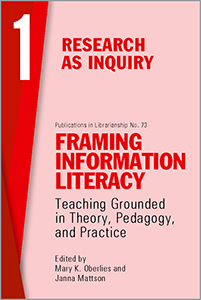Primary tabs
You don't need to be an ALA Member to purchase from the ALA Store, but you'll be asked to create an online account/profile during checkout to proceed. This Web Account is for both Members and non-Members. Note that your ALA Member discount will be applied at the final step of the checkout process.
If you are Tax-Exempt, please verify that your account is currently set up as exempt before placing your order, as our new fulfillment center will need current documentation. Learn how to verify here.
- Description
- Table of Contents
- About the authors
Research as Inquiry
Research is iterative and depends upon asking increasingly complex or new questions whose answers in turn develop additional questions or lines of inquiry in any field.
Many librarians struggle with the best methods, activities, and practices for teaching information literacy. Developing learning outcomes and activities, overcoming student and faculty apathy toward information literacy instruction, and meeting instructional and institutional goals can be difficult if you’re feeling overwhelmed with instructional jargon, or uncertain in your teaching due to no formal training.
Framing Information Literacy: Teaching Grounded in Theory, Pedagogy, and Practice is a collection of lesson plans grounded in theory and the ACRL Framework for Information Literacy for Higher Education. 52 chapters over six volumes provide approachable explanations of the ACRL Frames, various learning theory, pedagogy, and instructional strategies, and how they are used to inform the development of information literacy lesson plans and learning activities. Each volume explores one frame, in which chapters are grouped by broad disciplinary focus: social sciences, arts and humanities, science and engineering, and multidisciplinary. Every chapter starts with a discussion about how the author(s) created the lesson, any partnerships they nurtured, and an explanation of the frame and methodology and how it relates to the development of the lesson, and provides information about technology needs, pre-instruction work, learning outcomes, essential and optional learning activities, how the lesson can be modified to accommodate different classroom setups and time frames, and assessment.
The six volumes of Framing Information Literacy aim to address the teaching anxiety and insecurity librarians often experience by offering narratives with the lesson plans that provide insight into the work involved in developing a polished lesson plan; begin filling the teaching and learning knowledge gap for librarians in the context of information literacy, capturing the knowledge and practice of fifty-eight teacher librarians and five teaching faculty from forty-one institutions for others to incorporate and build upon; and to explore how teacher librarians use the ACRL Framework in conjunction with educational theory and pedagogy to help readers form their own approaches to teaching information literacy.
Each volume contains the table of contents and index for the entire set, as well as an overarching introduction and conclusion, for easy cross-referencing across volumes. Explore your favorite frame, or collect them all!
Acknowledgements
Introduction
Mary K. Oberlies and Janna Mattson, MLS
Volume 1. Research as Inquiry
Chapter 1. Using Student Curiosity to Generate Compelling Research Questions
Jannette L. Finch and Jolanda-Pieta van Arnhem, College of Charleston
Chapter 2. A Bird’s Eye View of the Research Process: Developing Students’ Attention to Research Practices, Iterations, and Inquiry
Jennifer Jarson, Pennsylvania State University-Leigh Valley
Chapter 3. Change is Hard: Using Conceptual Change Theory to Promote “Research as Inquiry”
Kimberly Miller, Towson University
Chapter 4. TOPIC Generation and Teaching Research as Inquiry
Katie Hassman and Benjamin Hassman, University of Iowa
Chapter 5. Patch and PACT Writing: Engaging Students with the ACRL Framework, Research as Inquiry
Kelly Diamond and Laura Brady, West Virginia University
Social Science
Chapter 6. Behind the Headlines: Current Events Topic Discovery and Exploration Using Historical Event Headlines
Mary K. Oberlies, University of Oregon
Chapter 7. Research as Inquiry: A Strategy for Questioning
Sharon Radcliff, California State University, East Bay
Science and Engineering
Chapter 8. “This is Terrifying!”: Problem-Based Learning, Information Literacy, and the Zika Virus
Maoria J. Kirker and Janna Mattson, George Mason University
Chapter 9. Know What You Don’t Know: Teaching Chemistry Students to Ask Better Research Questions
Talitha R. Matlin and Michael Schmidt, California State University, San Marcos
Chapter 10. Empowering Undergraduates in the Life Sciences with Information Literacy Skills for Graduate Research Readiness
Kelli Trei, University of Illinois at Urbana-Champaign
Conclusion
Index
Mary K. Oberlies
Mary K. Oberlies is the Undergraduate Engagement Librarian and Assistant Librarian at the University of Oregon. She received her MAIS from the University of Missouri-Columbia, an MA in Violence, Terrorism, and Security from Queen's University at Belfast, and a BA in International Studies from Berry College.
Janna Mattson
Janna Mattson is the Instructional and Social Sciences Librarian at George Mason University. She received her MEd from George Mason University along with a graduate certificate in eLearning, an MLS from Queens College, City University of New York, and a BA in Music from Virginia Commonwealth University.



